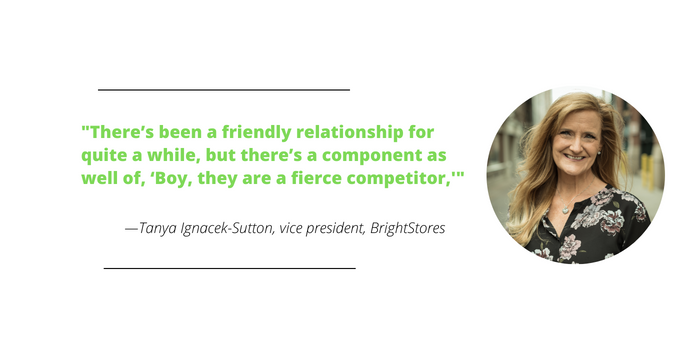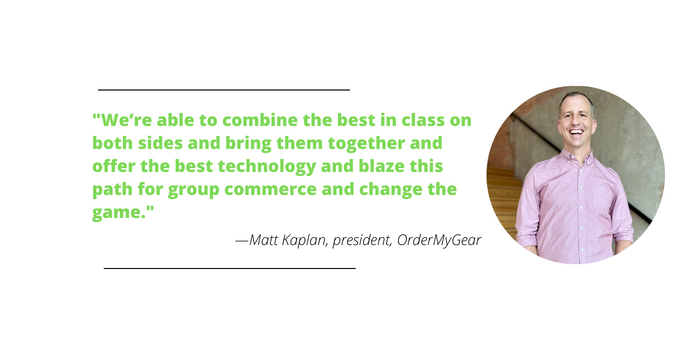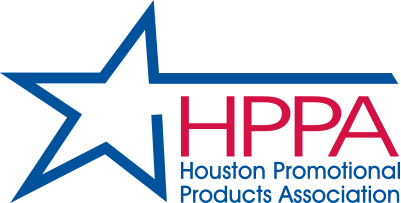There should be a word for the absence of recent tension in a room.
Perhaps “relief” is the closest description. Whatever the word, you could feel that dynamic in an OrderMyGear conference room on an early December afternoon in Dallas, only a few weeks after the announcement that OMG had acquired BrightStores, a Denver-based provider of online company stores for promotional products distributors.
At the table were OMG President Matt Kaplan and Mykayla Goodwin, vice president of strategy. Conferencing in from Denver was Tanya Ignacek-Sutton, vice president of BrightStores. The three executives had gotten to know each other over the years. Rivals turned teammates.
“There’s been a friendly relationship for quite a while, but there’s a component as well of, ‘Boy, they are a fierce competitor,’” Ignacek-Sutton says.
Both had been competing to serve clients in the industry. There didn’t seem to be any slowing to OMG’s growth and resources, but BrightStores strength was in serving distributors in promo, and the OMG top brass was at least a little envious of their competitors’ savvy in the market. The two companies even had history in that very same conference room.
“I met Dan [Halama, BrightStores’ founder and former president], three years ago,” Kaplan remembers. “We sat in this room. At that time, I never thought that we could get to a place where we would be together. Did I ever hope and dream? Of course.”
Kaplan’s hopes and dreams finally came to fruition. Announced November 14, the coming together of the two technology platforms will target the online needs of promotional product distributors, apparel decorators and team dealers.
“We’re able to combine the best in class on both sides and bring them together and offer the best technology and blaze this path for group commerce and change the game,” Kaplan says.
 ‘The Perfect Partner’
‘The Perfect Partner’
Any acquisition between two successful companies takes some amount of humility. BrightStores has grown in business every single year since it was founded in 1999, according to Ignacek-Sutton, and by any reasonable measure, it had the experience, the steady staff and the clients to continue to compete in the marketplace. It always offered to clients what Ignacek-Sutton refers to as “white glove support,” holding their hand through the process of making technology less complicated. In the promo world, that approach went a long way.
But both companies were led by people who believed in the benefits of conversations within industries, and in the past few years the leadership teams got together at The PPAI Expo, chatting about common problems and possible solutions.
Mutual clients would bring each company up to the other, identifying gaps on each side and reminding one company what the other excelled at. Executives at distributors, decorators or dealers were politely asking OMG if they ever considered partnering with BrightStores in some capacity.
This is where OMG’s humility comes in.
“We’re very honest with ourselves here internally,” Kaplan says. “We know what we’re great at, and we know what we’re not great at. We understand that Bright Stores does things that we do not do, cannot do and do not offer.”
OMG approached BrightStores, not as victors in a competition but by laying out what the two could accomplish together. To the BrightStores leaders, like Ignacek-Sutton, who had been with the company since the early days, this was enticing.
Ignacek-Sutton, who ultimately called the acquisition “wonderfully synergistic,” has seen the industry change over the years. She still sees it as small businesses doing what they could do with a small group of people: “That’s what BrightStores was.”
The client relationships were already there for BrightStores, as was the savvy to move nimbly within the industry’s evolution. But they were no longer just competing with small groups of people. OrderMyGear had resources BrightStores never would, not to mention the track record of growing a company. There was only one way for those resources to become available: agreeing to an acquisition.
“Our collective expertise is unmatched,” Halama says.
OrderMyGear, according to Ignacek-Sutton, was “the perfect partner,” due not only to the companies’ shared vision but the way each felt about their respective clients and staff. She estimates that the average tenure of BrightStores employees is about seven years.
“I think that speaks volumes,” Goodwin says, “and we want the exact same thing here.”
At a bigger company – under the umbrella of the two companies there will be nearly 150 employees, as opposed to about 20 at BrightStores previously – those long tenured BrightStores employees will inherit more than just resources; they will have greater opportunities to advance within the company.
The right perspective on technology helped each of these companies reach success, and that shared perspective helped bring them together. BrightStores had a front row for the technology’s rapid implementation of technology and e-commerce.
“I’ve seen little tiny companies grow into something magnificent, and I’ve seen big companies wither away because they just won’t embrace the technology,” Ignacek-Sutton says.
Group e-commerce made simple is ultimately what these companies can offer the promo industry – exciting ways to grow business delivered without a high barrier of knowledge for clients. Promotional products existed well before the internet, which is why some within the industry resist its resources even now. But OrderMyGear and BrightStores are in the business of changing that behavior, and it’s why Kaplan refers to the acquisition as “one of the most important partnerships that’s going to happen that can actually truly change the game in the industry.”
The pandemic forced businesses to understand how they can survive through e-commerce. OrderMyGear expects to help them thrive.
“The race started,” Goodwin says. “Catch up.”
Putting Gas On The Fire
Ignacek-Sutton admits that the hardest part in this initial stage of the merger is patience. She has seen OMG’s resources from afar, and it’s tempting to let her team loose like kids in a candy store. But Kaplan says that 2023 will be “business as usual” apart from both staffs getting better acquainted with their new colleagues.
Make no mistake, the two will eventually become one company offering a functional version of the best that each company has to offer. But Goodwin, who is running point on the integration, is determined to make the early stages “less about the integration of the technology and more about the integration of the people.”
BrightStores’ employees will be welcome to come operate out of OMG’s swanky office, walking distance from Dallas’ music hub known as Deep Ellum, but no one will be forced to move, and Kaplan anticipates that OMG will invest in a shared office space in Denver, as well.
They are each teasing to their respective clients the opportunities that this will mean for them, but everything takes time and precision, just like the acquisition itself. It was late summer when, in good faith, Halama opened up to letting his company be acquired by OrderMyGear. The OMG team immediately got busy with due diligence, researching the realistic options for such a move.
Halama and OrderMyGear CEO Leonid Rozkin, negotiated down to the eleventh hour, with even top leadership like Ignacek-Sutton, Goodwin and Kaplan often out of the loop on whether the deal would even happen. (Halama now sits on the OrderMyGear board.)
With the deal final, there are 4,000 combined clients. About 600 came from BrightStores, many of those large distributors that will soon gain access to the innovative features, such as pop-up shops, that OMG has to offer.
And for as much as Kaplan is doing his level best to preach patience with the integration, he will admit that there are things that they can do at OMG that will “turn BrightStores on its head.”
Goodwin puts it a little more boldly.
“They’re already on fire now. We’re just going to be putting gas on the fire,” she says.
Kaplan adds, “We’ve got a very robust sales and marketing engine.”
Technology platforms exist to enable clients to do more. BrightStores has always done that “nimbly,” as Ignacek-Sutton says, doing what they can with the resources they have and working within what their clients can handle. Now it’s OMG’s turn to enable their new acquisition to do more. They want to give BrightStores employees the opportunity to say “yes” to more things.
“Dan [Halama] has been passionately concerned with the future of BrightStores,” Ignacek-Sutton says. “I think it’s a relief to know that we’re now partnering with a company that can help us get to the next step.”
OrderMyGear has been in the team sporting goods space since its inception in 2008. Years before that, founder Kent McKeaigg’s father, Ronnie, was a sporting goods distributor who could have used the platforms that OrderMyGear and BrightStores would eventually provide.
Ronnie represents a client that this acquisition hopes to serve across the sporting goods and promotional products spaces. Seamless, effective online stores represent one of the few large-scale innovations this industry has seen in generations, and the potential client list is endless. Goodwin isn’t shy about her ambitions, now that BrightStores is in tow.
“I want all 42,000,” Goodwin says, referring to OMG’s estimated market size.
To Kaplan, the technology the combined companies offer is about more than maximizing a client’s potential or profits. Effective group e-commerce can improve the quality of life for distributor reps, who can spend less time on the road. They can reach more customers with more ease. It’s something that BrightStores has been doing for over two decades. Both companies can provide resources and tools to make the lives of distributors – and decorators and suppliers – easier.
OMG+BrightStores Reveal from PPAI on Vimeo.

Can They Change The Game?
OrderMyGear is ready to make that apparent to the world using the engine that has fueled its growth thus far.
“If you can tell the story about how easy it is to actually navigate these systems and use those tools, then you’ve actually won,” Kaplan says.
